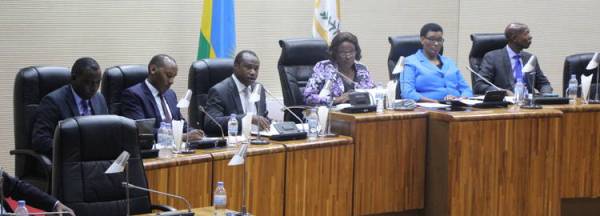
Kigali: As provided for under article 41 of Organic Law N°12/2013/OL of 12/09/2013 on State Finances and Property, the Minister of Finance and Economic Planning Dr. Uzziel Ndagijimana today tabled before Parliament the 2018-19 revised budget proposal.
Addressing members Parliament, Minister Ndagijimana pointed out that the budget revision process had been informed by the economic and budget performance for the first six months of 2018/19 financial year.
“We have carried out an assessment of the implementation status of the development projects allocated resources as well as continuing the budget rationalization process to ensure that public resources are spent where the desired impact is mostly achieved,” Minister Ndagijimana said.
In his proposal, Minister Uzziel Ndagijimana noted that the budget was projected to rise from Frw 2,443.5 billion approved by parliament in June, 2018 to Frw 2,585.2 billion reflecting a net increase of Frw 141.6 billion.
On the resources side, total revenue and grants will increase from Frw 1,904.9 billion projected in original budget to Frw 1,996.8billion, showing a net increase of Frw 91.9 Billion. Tax revenues are expected to increase by Frw 20 billion from FRW 1,353.0 billion in original budget to Frw 1,373.0 billion. This increase is expected to come from direct taxes as a result of good economic performance, which will offset a small decline in projected taxes on international trade.
Non tax revenue is projected to increase by Frw 42.7 billion from Frw 155.7 billion proposed in the original budget, to Frw 198.4 billion. This increase is expected from Peace Keeping Operations reimbursements from both new deployments and previously due repayments.
Total grants have been revised upwards by Frw 29.1 billion from Frw 396.3 billion in the original budget to Frw 425.4 billion. The increase reflects additional budget support of Frw 6.6 billion from DFID for textbooks development and Frw 22.5 billion additional grants from Global Fund for ongoing programs in health sector.
On the expenditure front, total expenditure and net lending is being raised from FRW 1,507 billion to FRW 1,557 billion showing a net increase of FRW 50 billion.
The expenditure envelope has been revised to reflect the changes for some items under recurrent spending and capital expenditure as follows:
The recurrent expenditure is expected to increase by Frw 43.9 billion from the original budget estimate of FRW 1,266.1 billion to FRW 1,310.0 billion. This rise will in turn see wages and salaries budget rise by Frw 8.7 billion from the original budget of Frw 437.4 billion to Frw 446.1 billion to cater for the planned 10 % increase in teachers’ salary, recruitments of new teachers as well as salaries for the recently established institutions such as Rwanda Food and Drugs Authority and the implementation of the reviewed institutions.
The recurrent non-wage budget will be raised by Frw 28.6 billion to Frw 1,098.1 billion from 1,069.5 billion. The increase will cater for the implementation of the revised Government fleet policy, operationalization of new Embassies (Harare and Maputo), operationalization of Rwanda Food and Drugs Authority (RFDA), refilling government petroleum reserves as well as the preparation for 25th commemoration for Genocide against Tutsi.
Capital expenditure will be raised by Frw 104.3 Billion from the original budget figure of Frw 936.6 Billion Frw 1,041.0 billion. The domestically financed portion is being raised by FRW 89 billion from the original budget amount of Frw 549.6 billion to Frw 638.6 billion. The increased amount will finance of Amahoro Stadium upgrades, key transmission lines and access to electricity projects, provision for technology trainings through the partnership with Andela Developer, Tourism Development projects, provision for ongoing contract of the supply of Fortified Blended Food and allocation for key projects financed by Global Fund.
The foreign financed portion will be increased by FRW 15.4 billion from the original budget of FRW 387.0 billion to Frw 402.4 billion to cater for key externally financed projects in infrastructure and agriculture sectors.
As a result of the proposed changes in the resources and expenditures figures, the overall cash deficit will increase by Frw 48.1 billion from the original figure of Frw 436.8 billion (representing 4.6% of GDP) to FRW 484.9 billion (representing 5.4% of GDP). The cash deficit will be financed with net foreign borrowings amounting to Frw 435.7 billion as budgetary and project loans (mostly concessional loans) and domestic financing amounting to Frw 49.2 billion. (End)
